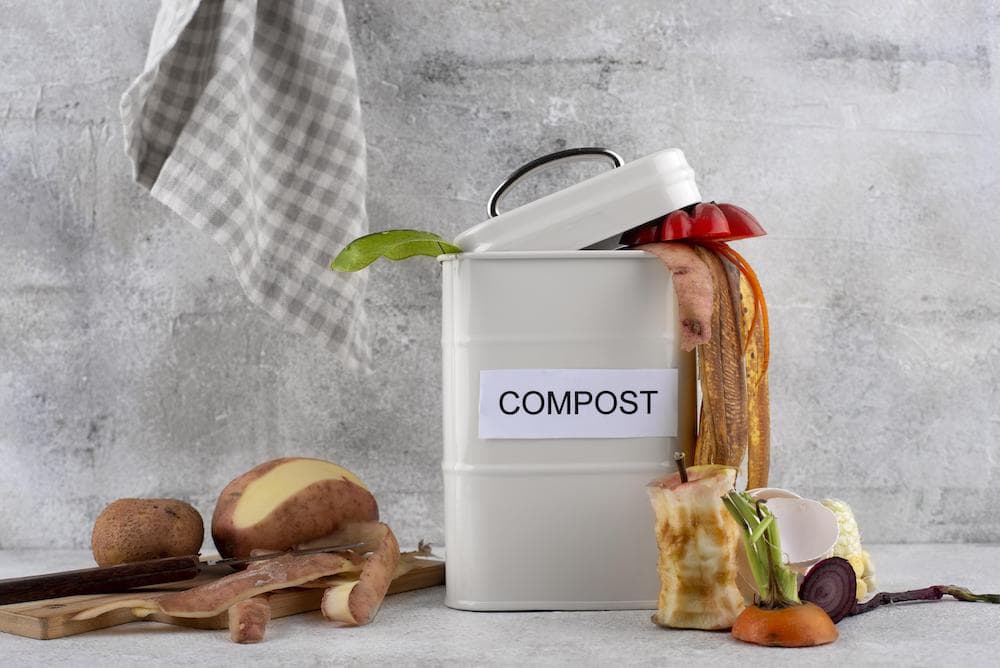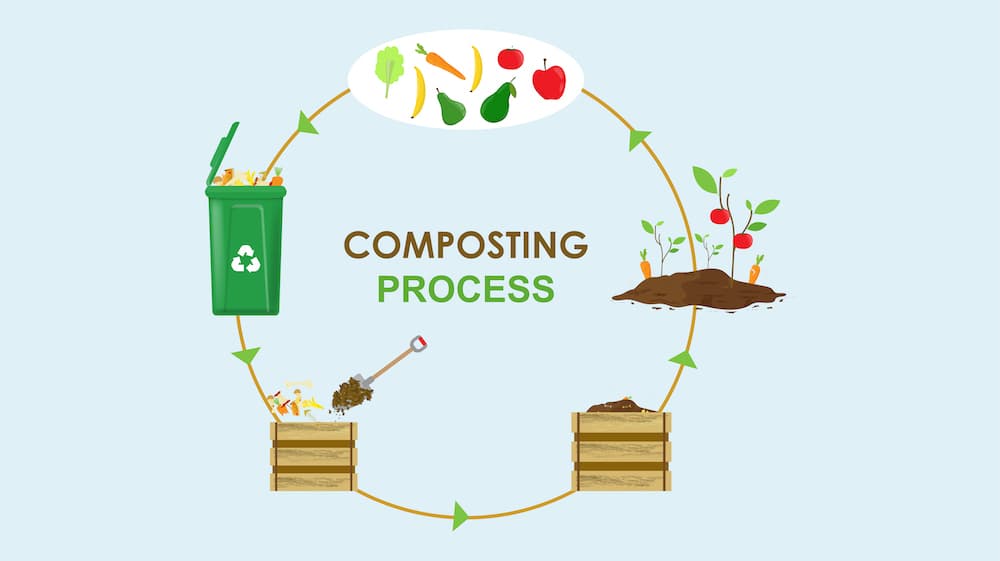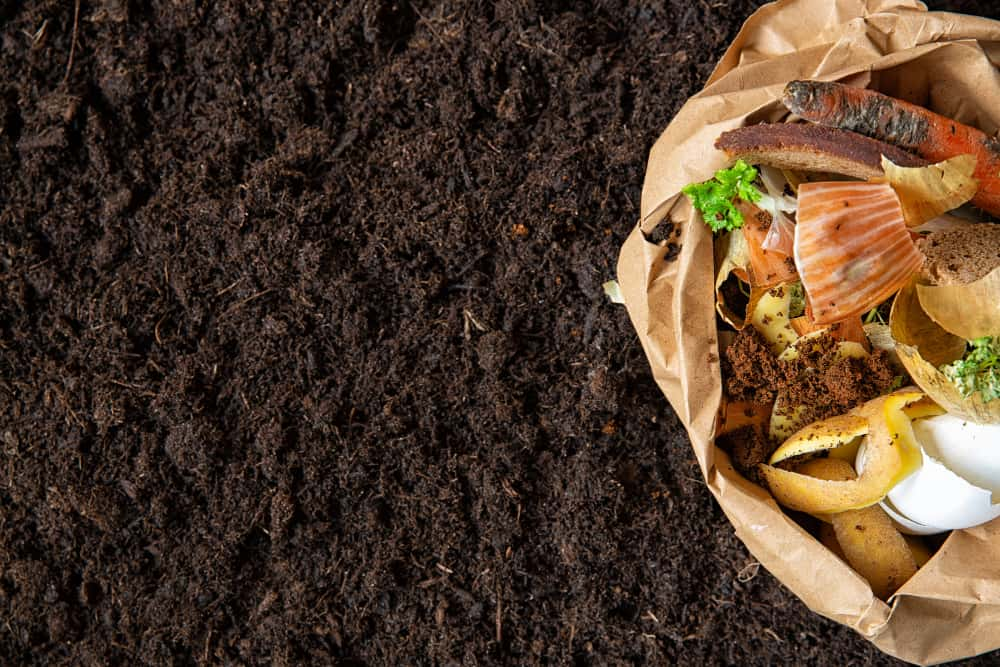How to Make Compost at Home?
Last Updated on December 27, 2022
How to Make Organic Compost at Home?
Composting at home may be a demanding and disturbing experience due to common misconceptions. It is thought to be bad-smelling, sloppy, and complicated. However, if you follow the correct steps, you may not face any of these problems. Instead, you can make your waste an invaluable contribution to your plants.

What is Organic Compost?
Organic compost is made from raw materials that come from organic sources. It is used to condition and fertilize the land. It comprises decayed organic material such as vegetables, manure, fruit, and dead leaves. A proper phase of decay is required to make it successful. Time is essential because different kinds of microbial and fungal instruments work to chemically break organic materials down to their fundamental nutrients.
Autumn is the best season to add compost to the raised beds because they will be ready by spring to be planted. Then, you can simply spread it on the soil, and natural reactions will work to reach the compost to the roots of the plants.
Pros and Cons of Compost
Making and using compost to grow healthy plants is very common and offers many benefits. On the other hand, it has some disadvantages one should consider before making and using it for plants.
Advantages of Composting
It offers many advantages that can make you decide to produce your compost at home.
- It is easy to make. You do not need a specific talent or education to do it.
- It promotes soil quality by enriching it with new nutrients and soil biota. This process provides the plants with better growth chances. In addition, the organic nutrients are released slowly into the soil, reducing the undesired loss of nutrients.
- It helps prevent erosion. It can bind the soil together as well as increase the infiltration of water, which decreases the stormwater effects on the soil and prevents erosion.
- It increases the soil’s capacity to hold water, benefiting the plants, especially in hot and dry summers.
- It helps you save money because you will no longer need chemical fertilizers sold on the market.
- It balances the soil’s density. If the soil is tighter than needed for the plant, compost will help lose it. If the soil is too loose, compost will help bind it together.
- It reduces your carbon footprint by reducing the amount of waste you produce. Typically, our waste causes land pollution in landfills or air pollution because it is burned. By turning your waste into a soil amendment that will benefit your plants, you help save the planet.
- It helps fight against climate change. Its most significant contribution is reducing the greenhouse gases in landfills. Moreover, by improving healthy plant growth, it promotes plants’ carbon dioxide take in.
Disadvantages of Composting
Despite its many advantages, it has some disadvantages before starting composting at home.
- You will need some extra equipment, such as composting bin and a rake, which can increase your household cost at the beginning of the process.
- It causes an unpleasant smell during the decay phase.
- It attracts bugs, and sometimes even rats or snaked can be attracted.
- Compared to the chemical fertilizers you can grab in the store, it takes effort and a long time to benefit.
Is Compost Acidic?
During the decay phase, the compost PH varies when microorganisms still work on the material. When the ingredients in the bin start to turn black, smelly, and wet, the compost is acidic, meaning its PH level is less than 7. When the process is finished, it has a neutral PH between 6 and 7. You can read the preparing garden soil blog to learn more about soil PH levels.
Is Compost Good for Vegetable Gardens?
Yes, it is! It helps control the soil’s moisture. It improves water-holding capacity and increases drainage. Therefore, using compost in your vegetable garden will provide many benefits.
Why Compost at Home?
When you start composting, there will reduce your trash. Therefore, it helps save money on trash disposal. In addition, it is a step towards saving the Earth since it reduces carbon emissions in the atmosphere. Lastly, it is free and is the most effective fertilizer for the soil in your garden and houseplants.
How to Make Compost at Home?

The first thing you should do is to find a proper place. It is better to find a location where there is good airflow and where you can reach water easily. Also, it must not be too hot in the summer or too cold in the winter. The next thing you need is a bin. You can buy a composting bin that will make things easier or build one for yourself. Add materials you want to turn into compost in the bin and watch out for the temperature, moisture, aeration, and carbon and nitrogen levels.
What to Compost?
You must choose certain types of things to be successful.
- Fruit and vegetable scraps
- Houseplants
- Grass clippings
- Yard trimmings
- Leaves
- Eggshells
- Wood and bark chips
- Paper
- Cardboard
- Newspaper
- Wool and cotton rags
- Teabags
- Coffee grounds
- Fur and hair
Is There Anything That You Shouldn’t Put in Your Compost?
Yes, you need to exclude some items from the list.
- Meat and fish scraps
- Fats and oils
- Dairy products
- Pet wastes
- Black walnut tree debris
- Coal or charcoal ash
- Insect-infested or diseased plants
- Wood or plants treated with chemical pesticides

What if the Compost is too Wet?
Too wet leads to problems such as bad smells, insects, flies, and, most importantly, harmful substances for your plants. It generally occurs due to an unbalanced mix of fresh and dry materials put in the bin. If you add too much fresh material, it prevents airflow from filling air channels with water. If you come across such a problem, dig the heap up entirely. Let it incorporate air and restack it after adding enough dry materials to have a balanced mixture of wet and dry ingredients. Adding smaller pieces of cardboard, sawdust, or shredded prunings helps you have better drainage to prevent excess moisture.
If Compost Smells?
The file may have a stinky smell if there is an imbalance between the green and brown materials in a heap, or if it is too wet or too compacted. To fix the problem, first, find the reason. If there are too many green materials, adding some brown ingredients would help. You should turn the pile to allow aeration if it is too compacted. Adding brown material to absorb unnecessary water will solve the problem if there is too much moisture.
Which Compost is Best for Plants?
Potting compost is the best for plant growth. You can prefer multi-purpose peat-free compost if you raise flowering bedding plants, leafy salad, or herbs.
Which Compost is Best for Vegetables?
Growing vegetables require vital nutrients to a high degree. Therefore, you must choose a specific compost type rather than a common gardening mix. The most effective one for your vegetables is the one with a good amount of organic matter. Food scraps, grass or plant clippings, peat moss, or tea bags are perfect organic materials to grow healthy vegetables. Moreover, heavily broken-down manure can be rich in nutrients that your vegetable garden needs.
Which Compost Bin is Best?
Determining which compost bin is the best for you depends on your preferences. One who needs a fast one should choose a compost tumbler. You can easily provide the required aeration by tumbling the barrel-like tumbler. However, if you want to take your time and have a more affordable option, you should try compost bins. They are larger than tumblers and require manual aeration. Worm composting bins are another option for those who prefer to use the bin inside or out any time of the year.
Are Compost and Fertilizer the Same Thing?
No, they are not! It is a natural and organic material used to improve soil quality. On the other hand, a fertilizer, produced by keeping exact ratios of specific substances, can be either organic or chemical. While using compost to enrich the soil has more advantages than disadvantages, using fertilizer may have a lot of disadvantages. Fertilizers may harm the soil and its microbial balance. While compost is intended to feed the soil, fertilizers are preferred to feed the plants and make them grow faster.
Composting at home is a simple process, and it provides you with many benefits. If you want to turn your waste into an amendment to your garden soil and help your plants grow strong and healthy, you should try making your compost at home. Moreover, you will help save the Earth by your effort to turn your waste into a soil amendment.
How To Reach Locally Grown Fresh Food?
Urbanicfarm has a revolutionary way to reach locally grown, fresh food. We connect micro gardening producers to the local distribution network across the country. Using the Urbanic Farm mobile app or website, local farmers, home gardeners, and micro farmers connect directly with consumers in their area –and lower freight costs.
To build a new foundation for a streamlined fresh food supply chain and social network, UrbanicFarm registers Gardeners–micro farmers and local farms with produce to sell, and Consumers who want fresh, garden-direct food. We provide a map of their area updated with the locations and offerings of fresh local produce. If you have a fruit tree, extra produce from your garden, or other food you won’t use, you can offer them free, for sale, or for trade. Many home gardeners offer extra tomatoes, zucchini, and cucumbers from their gardens. Many trades for oranges, lemons, and apples. These are great ways for communities to collaborate and reduce food waste!

